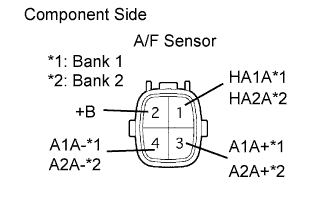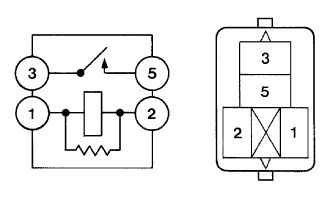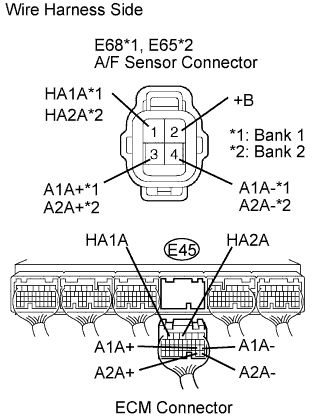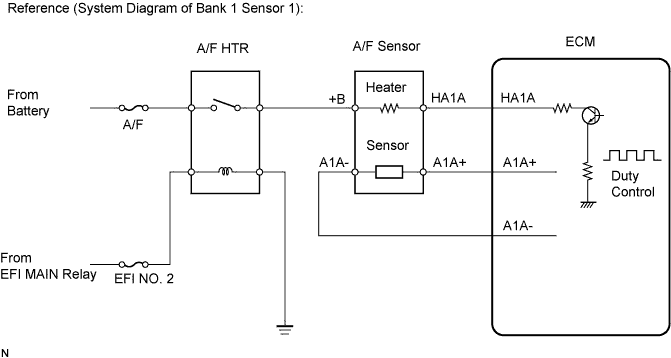Engine. Lexus Gs430, Gs300. Uzs190 Grs190
3Gr-Fse Engine Control System. Lexus Gs430, Gs300. Uzs190 Grs190
INSPECT AIR FUEL RATIO SENSOR (HEATER RESISTANCE)
CHECK HARNESS AND CONNECTOR (A/F SENSOR - ECM)
DTC P2238 Oxygen (A/F) Sensor Pumping Current Circuit Low (Bank 1 Sensor 1) |
DTC P2239 Oxygen (A/F) Sensor Pumping Current Circuit High (Bank 1 Sensor 1) |
DTC P2241 Oxygen (A/F) Sensor Pumping Current Circuit Low (Bank 2 Sensor 1) |
DTC P2242 Oxygen (A/F) Sensor Pumping Current Circuit High (Bank 2 Sensor 1) |
DTC P2252 Oxygen (A/F) Sensor Reference Ground Circuit Low (Bank 1 Sensor 1) |
DTC P2253 Oxygen (A/F) Sensor Reference Ground Circuit High (Bank 1 Sensor 1) |
DTC P2255 Oxygen (A/F) Sensor Reference Ground Circuit Low (Bank 2 Sensor 1) |
DTC P2256 Oxygen (A/F) Sensor Reference Ground Circuit High (Bank 2 Sensor 1) |
DESCRIPTION
- HINT:
- Although the DTC titles say oxygen sensor, these DTCs relate to the Air-Fuel Ratio (A/F) sensor.
- Sensor 1 refers to the sensor mounted in front of the Three-Way Catalytic Converter (TWC) and located near the engine assembly.
| DTC No. | DTC Detection Condition | Trouble Area |
| P2238 P2241 |
(1 trip detection logic): (a) AF+ voltage 0.5 V or less (b) (AF+) - (AF-) = 0.1 V or less
(2 trip detection logic) |
|
| P2239 P2242 | AF+ voltage more than 4.5 V for 5.0 seconds or more (2 trip detection logic) |
|
| P2252 P2255 | AF- voltage 0.5 V or less for 5.0 seconds or more (2 trip detection logic) |
|
| P2253 P2256 | AF- voltage more than 4.5 V for 5.0 seconds or more (2 trip detection logic) |
|
- HINT:
- DTCs P2238, P2239, P2252 and P2253 indicate malfunctions related to bank 1 A/F sensor circuit.
- DTCs P2241, P2242, P2255 and P2256 indicate malfunctions related to bank 2 A/F sensor circuit.
- Bank 1 refers to the bank that includes cylinder No. 1.
- Bank 2 refers to the bank that includes cylinder No. 2.
MONITOR DESCRIPTION
The Air-Fuel Ratio (A/F) sensor varies its output voltage in proportion to the air-fuel ratio. If the A/F sensor impedance (alternating current resistance) or output voltage deviates greatly from the standard range, the ECM determines that there is an open or short malfunction in the A/F sensor circuit.WIRING DIAGRAM
Refer to DTC P2195 on page Click here.INSPECTION PROCEDURE
- HINT:
- Intelligent tester only:
- Malfunctioning areas can be identified by performing the Control the Injection Volume for A/F Sensor function provided in the Active Test. The Control the Injection Volume for A/F Sensor function can help to determine whether the Air-Fuel Ratio (A/F) sensor, Heated Oxygen (HO2) sensor and other potential trouble areas are malfunctioning.
- Connect the intelligent tester to the DLC3.
- Start the engine and turn the tester ON.
- Warm up the engine at an engine speed of 2,500 rpm for approximately 90 seconds.
- On the tester, enter the following menus: Power train / Engine / Active Test / Control the Injection Volume for A/F Sensor.
- Perform the Control the Injection Volume for A/F Sensor operation with the engine in an idling condition (press the RIGHT or LEFT button to change the fuel injection volume).
- Monitor the output voltages of the A/F and HO2 sensors (AFS B1 S1 and O2S B1 S2 or AFS B2 S1 and O2S B2 S2) displayed on the tester.
- HINT:
- The Control the Injection Volume for A/F Sensor operation lowers the fuel injection volume by 12.5 % or increases the injection volume by 24.8 %.
- Each sensor reacts in accordance with increases and decreases in the fuel injection volume.
- Standard:
Tester Display
(Sensor)Injection Volume Status Voltage AFS B1 S1 or AFS B2 S1
(A/F)+24.8 % Rich Less than 3.0 AFS B1 S1 or AFS B2 S1
(A/F)-12.5 % Lean More than 3.35 O2S B1 S2 or O2S B2 S2
(HO2)+24.8 % Rich More than 0.55 O2S B1 S2 or O2S B2 S2
(HO2)-12.5 % Lean Less than 0.4
- NOTICE:
- The Air-Fuel Ratio (A/F) sensor has an output delay of a few seconds and the Heated Oxygen (HO2) sensor has a maximum output delay of approximately 20 seconds.
| Case | A/F Sensor (Sensor 1) Output Voltage | HO2 Sensor (Sensor 2) Output Voltage | Main Suspected Trouble Areas | ||
| 1 | Injection Volume +25 % -12.5 % |  | Injection Volume +25 % -12.5 % |  | - |
| Output Voltage More than 3.35 V Less than 3.0 V |  | Output Voltage More than 0.55 V Less than 0.4 V |  | ||
| 2 | Injection Volume +25 % -12.5 % |  | Injection Volume +25 % -12.5 % |  |
|
| Output Voltage Almost no reaction |  | Output Voltage More than 0.55 V Less than 0.4 V |  | ||
| 3 | Injection Volume +25 % -12.5 % |  | Injection Volume +25 % -12.5 % |  |
|
| Output Voltage More than 3.35 V Less than 3.0 V |  | Output Voltage Almost no reaction |  | ||
| 4 | Injection volume +25 % -12.5 % |  | Injection Volume +25 % -12.5 % |  |
|
| Output Voltage Almost no reaction |  | Output Voltage Almost no reaction |  | ||
- Following the Control the Injection Volume for A/F Sensor procedure enables technicians to check and graph the output voltages of both the A/F and HO2 sensors.
- To display the graph, enter the following menus: Power train / Engine / Active Test / Control the Injection Volume for A/F Sensor and Data List / AFS B1 S1 and O2S B1 S2 or AFS B2 S1 and O2S B2 S2.
- HINT:
- Read freeze frame data using the intelligent tester. Freeze frame data records the engine conditions when malfunctions are detected. When troubleshooting, freeze frame data can help determine if the vehicle was running or stopped, if the engine was warmed up or not, if the air-fuel ratio was lean or rich, and other data from the time the malfunction occurred.
| 1.INSPECT AIR FUEL RATIO SENSOR (HEATER RESISTANCE) |
 |
Disconnect the E68 or E65 Air-Fuel Ratio (A/F) sensor connector.
Measure the resistance of the terminals of the A/F sensor connector.
- Standard resistance (Bank 1 sensor 1):
Tester Connection Specified Condition HA1A (1) - +B (2) 1.8 to 3.4 Ω at 20°C (68°F) HA1A (1) - A1A- (4) 10 kΩ or higher
- Standard resistance (Bank 2 sensor 1):
Tester Connection Specified Condition HA2A (1) - +B (2) 1.8 to 3.4 Ω at 20°C (68°F) HA2A (1) - A2A- (4) 10 kΩ or higher
Reconnect the A/F sensor connector.
|
| ||||
| OK | |
| 2.INSPECT A/F HTR RELAY |
 |
Remove the A/F HTR relay from the engine room No. 2 relay block.
Measure the resistance of the A/F HTR relay.
- Standard resistance:
Tester Connection Specified Condition 3 - 5 10 kΩ or higher 3 - 5 Below 1 Ω
(when battery voltage applied to terminals 1 and 2)
Reinstall the A/F HTR relay.
|
| ||||
| OK | |
| 3.CHECK HARNESS AND CONNECTOR (A/F SENSOR - ECM) |
 |
Disconnect the E68 and E65 A/F sensor connector.
Turn the engine switch on (IG).
Measure the voltage between the +B terminal of the A/F sensor connector and body ground.
- Standard voltage:
Tester Connection Specified Condition +B (E68-2) - Body ground 9 to 14 V +B (E65-2) - Body ground 9 to 14 V
Turn the engine switch off.
Disconnect the E45 ECM connector.
Measure the resistance.
- Standard resistance (Check for open):
Tester Connection Specified Condition HA1A( E68-1) - HA1A (E45-6) Below 1 Ω A1A+ (E68-3) - A1A+ (E45-18) Below 1 Ω A1A- (E68-4) - A1A- (E45-17) Below 1 Ω HA2A (E65-1) - HA2A (E45-4) Below 1 Ω A2A+ (E65-3) - A2A+ (E45-28) Below 1 Ω A2A- (E65-4) - A2A- (E45-27) Below 1 Ω
- Standard resistance (Check for short):
Tester Connection Specified Condition HA1A( E68-1) or HA1A (E45-6) - Body ground 10 kΩ or higher A1A+ (E68-3) or A1A+ (E45-18) - Body ground 10 kΩ or higher A1A- (E68-4) or A1A- (E45-17) - Body ground 10 kΩ or higher HA2A (E65-1) or HA2A (E45-4) - Body ground 10 kΩ or higher A2A+ (E65-3) or A2A+ (E45-28) - Body ground 10 kΩ or higher A2A- (E65-4) or A2A- (E45-27) - Body ground 10 kΩ or higher
Reconnect the ECM connector.
Reconnect the A/F sensor connector.

|
| ||||
| OK | ||
| ||